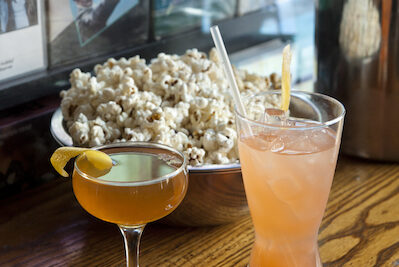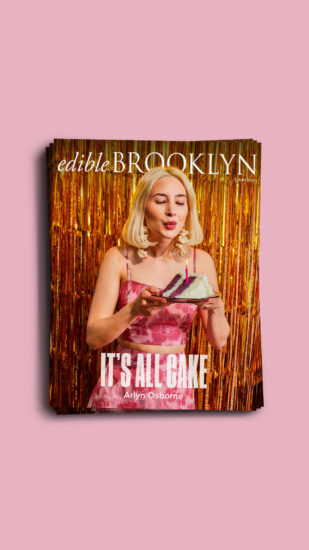WILLIAMSBURG — Nitehawk Cinema is a place where first-run films flicker next to seemingly forgotten reels of B-movies, where VHS boxes dug up from shuttered Curtis Mathes stores cover the walls, sealed in a Plexiglas purgatory. As your eyes feast on the faded covers of Sleepaway Camp, Chopping Mall and Shock Waves, a ripple of nostalgia sweeps over you, recalling a testament from your 12-year-old self: “I WILL rent this when I’m older.”
Certainly, your pint-size mind would have reeled had it known that such campy treats would decades later play on Nitehawk’s silver screens. As if granting these celluloid wishes weren’t enough, Nitehawk founder and executive director Matthew Viragh was the brains that brought this cinephile’s dream of a 35mm utopia something even juicier: booze.
He’d been served beer and wine in theaters before — at McMenamin’s in Portland in the late ’80s, Alamo Drafthouse in Austin in the ’90s and ArcLight in Los Angeles in the early aughts. But when Viragh arrived in New York in 2002, he was surprised such a civilized cinema experience was unheard of here and soon found out old laws were to blame.
“I discovered later that a Prohibition-era law banned alcohol sales in motion picture theaters in New York. I spoke with people who suggested the law was potentially pushed through by groups that controlled the Prohibition-era alcohol trade,” says Viragh. The implication was that Italian mobsters wanted to keep alcohol sales away from the groups that controlled the movie exhibition business, predominantly Jews. Viragh decided it was time for a change.
So he conceived of the Nitehawk Cinema and tasked lobbyist Keith Sernick, of State Street Advisers, to research New York’s liquor laws. Sernick struck gold: a small section in the Moreland Commission Report stating that legitimate dinner theaters should be allowed to serve alcohol. It became the precedent for changing the law; they lobbied for over two years.
Meanwhile Viragh, who traded his career in fashion advertising to dream up Nitehawk, took early inspiration from the Commodore Theatre in Portsmouth, Virginia, one of the first cinema eateries.
“Owner Fred Schoenfeld had restored the Art Deco theater in the ’80s, installing a kitchen and dining room on the orchestra floor. He and his wife were gracious enough to put me up for the summer while I trained at the theater. I quit my advertising job and worked every position available at the theater — box office, projection, kitchen, admin, film booking, even construction.”
But at Nitehawk, he couldn’t build his dream until the state rules changed. In the end, it was Viragh himself who rewrote the Prohibition-era law. Senator Carl Marcellino agreed to sponsor the new bill as an economic development tool, in hopes that the state’s smaller independent theaters would thrive again — if patrons were offered craft cocktails and a creative culinary experience. In October 2011, three months after Nitehawk’s opening, Governor Cuomo signed the bill over-turning the ban of alcohol in New York State theaters. It coincided perfectly with the theater’s first run of The Rum Diaries.
Originally, Nitehawk’s bar was planned as an annex, but Viragh wanted to create a truly immersive experience. Today a wait staff with ninja-like dexterity serves and buses the theater’s intimate two-top tables, without interrupting your viewing experience. If, in the middle of Birdman, you begin to crave what the menu calls Good Bird — crispy chicken wings with dill yogurt sauce — simply scribble a note beneath the dim lights under your table for your stealthy server.
Food and drink menus that pay homage to the films on screen are just part of the reason why Nitehawk is the most fun you’ll ever have in a dark room with a projector. Since opening, Nitehawk has expanded its roster of reels while throwing in excellent history lessons, cover bands and, often, killer pairings.
The Deuce celebrates the 1970s mainstays of 42nd Street’s Marquee Alley with guest lectures from film historians. An outdoor screening of Chicago was sponsored by Brooklyn Brewery and hosted by toast-of-the-town crooner Michael Arenella. Last fall saw a tasty treatment of Pulp Fiction complete with Honey Bunny cocktails, $5 shakes spiked with barrel-aged vodka and a burger to run circles around Le Big Mac.
And one of Nitehawk’s cult mainstays is vintage Saturday morning cartoon screenings, complete with a sugar cereal bar and White Russians topped with Cocoa Puffs.
Thanks to Nitehawk’s rewriting the laws governing vino and vittles, similar cinema offerings may be coming across New York State soon to a theater near you.



